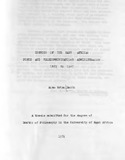| dc.description.abstract | The East African Ports and telecommunications administration enjoyed a priviledged constitutional. position.
Responsible to Central Legislative Assembly and raising
its capital by commercial loan , the post office suffered
little government control over its political. or financial
policies. This structure had II) precedent. It developed
out of the problems inherent in the operation of an interteritorial service. Until 1925, the principal difficulties
lay ill the balance between the level of business and the administrative
organisation. Between 1925 and 1949, the Post
Office faced a variety of financial and technological problems.
After 1949, the Administration, designed to avoid political
troubles and to secure adaptable policies, defined its responsibilities so narrowly that it lost touch with political development in East Africa. In 1967, under the provisions in the.
Treaty for east African Co-operation, the national Governments
of Kenya, Uganda, and Tanzania imposed their control upon the
Administration | en |

